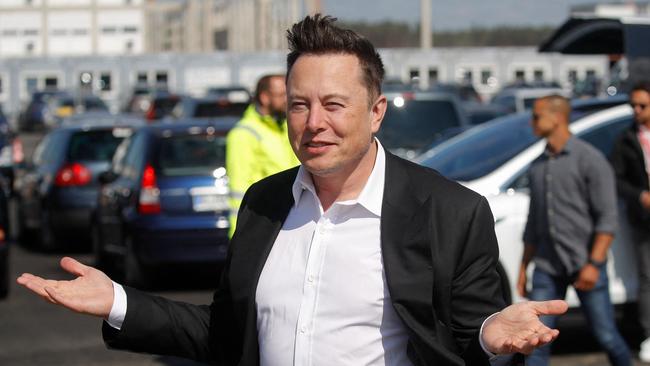Elon Musk must sell $US1.5bn bitcoin holding: Tesla short-seller ’
Elon Musk must end Tesla’s $US1.5bn bitcoin investment if he’s to regain investor support, says short-seller Nicholas Bolton.

Tesla short-seller Nicholas Bolton says Elon Musk must take more radical action and dump the car maker’s $US1.5bn ($1.94bn) bitcoin holding if it’s to arrest the slide in its share price and regain the support of environmentally-conscious investors.
Mr Bolton’s call came as bitcoin slumped almost 10 per cent to below $US45,000 for the first time in almost three months after Mr Musk implied in a Twitter exchange over the weekend that Tesla might sell, or has sold, its holding in the cryptocurrency.
When a Twitter user with the handle @CryptoWhale tweeted that he wouldn’t blame Mr Musk if Tesla dumped its bitcoin holding given “the amount of hate @elonmusk is getting”, the Tesla boss responded: “Indeed.”
Tesla announced last Thursday it would suspend vehicle purchases using bitcoin, prompting Mr Bolton to note that the carmaker’s stock had retreated more than 30 per cent since it disclosed its investment in February.
“Investment funds with an ESG (environmental, social and corporate governance) mandate, which likely made up a large part of Tesla’s register, may have been forced sellers of Tesla due to the serious environmental impact of the investment,” he told The Australian.
“If Tesla wants to win back the support of the ESG funds, it will have to go one step further and sell its bitcoin holding.
“No doubt that would have a significant impact on the bitcoin price if and when it happens.”
Announcing the suspension of the bitcoin payment policy only three months after it was flagged, Mr Musk cited concerns about the “rapidly increasing use of fossil fuels for bitcoin mining and transactions, especially coal, which has the worst emissions of any fuel”.
While cryptocurrency was a good idea on many levels and had a promising future, the Tesla chief said it could not come “at great cost to the environment”.
“Tesla will not be selling any bitcoin and we intend to use it for transactions as soon as mining transitions to a more sustainable energy,” he said on Twitter.
“We are also looking at other cryptocurrencies that use (less than) 1 per cent of bitcoin’s energy/transaction.”

Mr Musk later doubled down on his criticism of the bitcoin network’s energy consumption, describing it as “insane” over the past few months and posting a chart on Twitter from the University of Cambridge for good measure.
Environmentalists and ESG funds have excoriated Tesla since the company revealed in February that it had amassed a huge stake in the world’s biggest digital currency.
Only days before the announcement, the stock had surged to a record intraday high of $US961, prompting critics like Mr Bolton to later accuse Mr Musk of “staggering hypocrisy” and putting Tesla’s environmental halo at risk as he chased cryptocurrency riches.
Mr Bolton, a Gen Y investor who famously banked a $4.5m Leighton cheque in the 2009 BrisConnections saga in return after handing over voting rights which could have stalled the $4.8bn Airport Link toll road in Brisbane, became a small-scale bitcoin miner in China so he could understand the mechanics of an asset class which confounds others.
He said in March that bitcoin was probably worth “absolutely nothing” and was “one of the world’s most significant and offensive polluters”.
“It emits significantly more greenhouse gas emissions than New Zealand, all for its pointless (and usually criminal) endeavours,” Mr Bolton said.
“It’s one thing to pollute for a legitimate need like air travel, but quite another for the totally arbitrary programming logic of bitcoin that incentivises its miners.”
Bitcoin miners are paid in the cryptocurrency for effectively doing the work of auditors, securing the network and processing every bitcoin transaction by solving a computational problem.
The resulting blocks of transactions are chained together; hence the name of the system’s “blockchain” backbone.
From his own experience, Mr Bolton told The Australian that viable bitcoin mining required a power price of below US6c per kWh, and the only country where you could rely on getting a price that cheap was China, which burnt “some of the dirtiest coal you could imagine”.
“Inevitably, mining competition will bring marginal cost up to the bitcoin market price, so the higher the price goes, the worse it is for the environment and global productivity,” he said.
Of course, there were bigger, institutional critics of bitcoin’s environmental impact.
Bank of America Securities said in March that bitcoin’s environmental credentials were “poor”, with the network’s carbon emissions already matching those of Greece.
The firm said in a comprehensive, 49-page review that a $US1bn fresh inflow of funds into bitcoin could cause emissions to rise by the equivalent of 1.2 million vehicles with internal combustion engines.
BofA said the link between prices, energy demand and carbon dioxide meant bitcoin was tied to Chinese coal.
“Should the bitcoin price rise to $US1m (from $US52,180), it may turn into the world’s fifth-largest emitter, surpassing Japan,” the review said.
“On social and governance issues, democratisation of money and anonymity of ownership can be positive, as it is helpful in territories with corrupt financial systems and lowers costs by eliminating intermediaries. But negatives outweigh. Anonymity aids nefarious activities.”



To join the conversation, please log in. Don't have an account? Register
Join the conversation, you are commenting as Logout